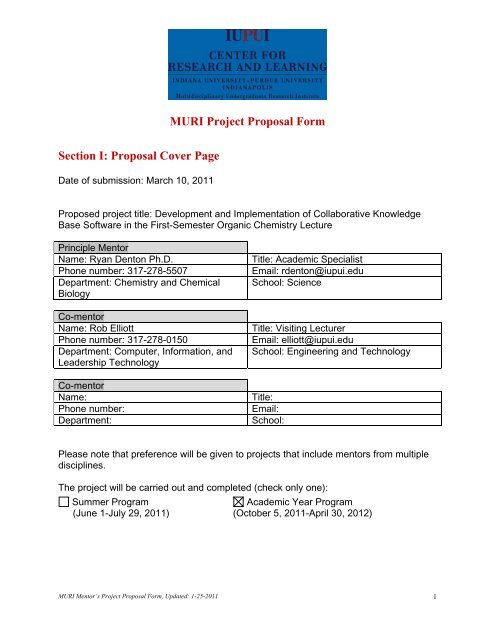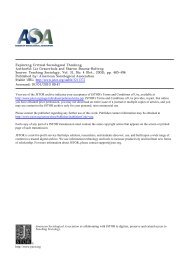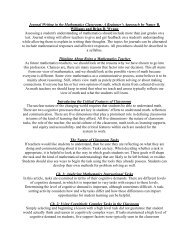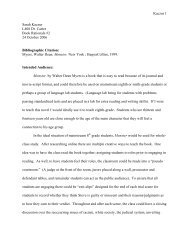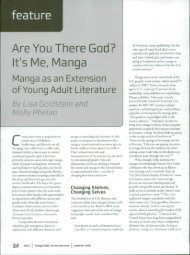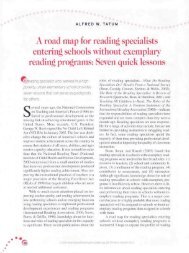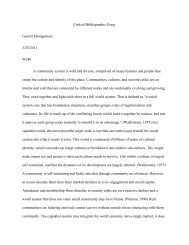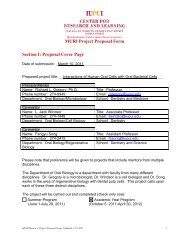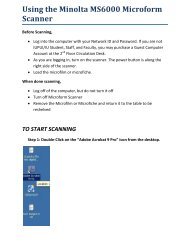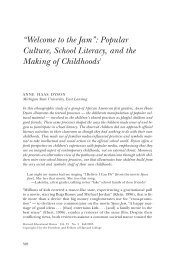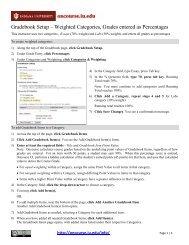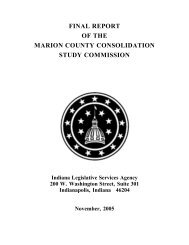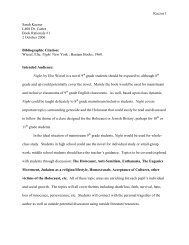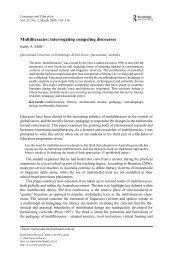Proposal - Oncourse - Indiana University
Proposal - Oncourse - Indiana University
Proposal - Oncourse - Indiana University
Create successful ePaper yourself
Turn your PDF publications into a flip-book with our unique Google optimized e-Paper software.
MURI Project <strong>Proposal</strong> Form<br />
Section I: <strong>Proposal</strong> Cover Page<br />
Date of submission: March 10, 2011<br />
Proposed project title: Development and Implementation of Collaborative Knowledge<br />
Base Software in the First-Semester Organic Chemistry Lecture<br />
Principle Mentor<br />
Name: Ryan Denton Ph.D.<br />
Phone number: 317-278-5507<br />
Department: Chemistry and Chemical<br />
Biology<br />
Co-mentor<br />
Name: Rob Elliott<br />
Phone number: 317-278-0150<br />
Department: Computer, Information, and<br />
Leadership Technology<br />
Co-mentor<br />
Name:<br />
Phone number:<br />
Department:<br />
Title: Academic Specialist<br />
Email: rdenton@iupui.edu<br />
School: Science<br />
Title: Visiting Lecturer<br />
Email: elliott@iupui.edu<br />
School: Engineering and Technology<br />
Title:<br />
Email:<br />
School:<br />
Please note that preference will be given to projects that include mentors from multiple<br />
disciplines.<br />
The project will be carried out and completed (check only one):<br />
Summer Program<br />
Academic Year Program<br />
(June 1-July 29, 2011) (October 5, 2011-April 30, 2012)<br />
MURI Mentor’s Project <strong>Proposal</strong> Form, Updated: 1-25-2011 1
Section II: Student Request Page<br />
Total number of students requested: four<br />
(Note: The total number of students must exceed the number of mentors by two)<br />
Total number of freshmen and/or sophomores to be recruited: one (no recommendations)<br />
Disciplines or majors of students (preference will be given to projects that include at least two<br />
disciplines or majors): Chemistry, Science Education, Information Technology, and Human-<br />
Computer Interaction<br />
Skills expected from students: Students with expertise in organic chemistry, having excelled in<br />
the classroom and laboratory, are desired for their ability to help creatively shape content<br />
development for the knowledge base. We are specifically targeting students who have a desire<br />
to pursue chemistry in academia, as this research in chemical education could have a dramatic<br />
effect on their future ability as educators. Information Technology students with strengths in<br />
systems analysis, database construction, and interface design will be needed to ensure that the<br />
software needed by the Department of Chemistry and Chemical Biology will be scalable and<br />
usable to both students and faculty.<br />
Names of students you request to work on this project. Tyler Crumpacker, Dagny Colgan,<br />
Jordan Warner<br />
(Mentors are invited to recommend students that they would prefer to work on the proposed<br />
project. Please provide an email address and a rationale; for example, a student may have an<br />
essential skill, may already be working on a similar project, or may be intending to apply to<br />
graduate school to pursue the same area of research.)<br />
The Center for Research and Learning will consider the students requested below, but cannot<br />
guarantee placement of specific students on teams.<br />
Name of Student: Student’s Email: Rationale:<br />
1)_Tyler Crumpacker__ tcrumpac@iupui.edu currently involved in initial KB content<br />
development, interested in pursuing career in academia<br />
2)_Jordan Warner____ jorwarne@iupui.edu interested in a career in chemical<br />
education<br />
3)_Dagny Colgan_____ dacolgan@iupui.edu agreed to be involved as programmer<br />
for summer 2011 pilot<br />
MURI Mentor’s Project <strong>Proposal</strong> Form, Updated: 1-25-2011 2
Section III: Body of <strong>Proposal</strong><br />
Research Objectives<br />
<br />
<br />
<br />
<br />
<br />
<br />
<br />
Develop and improve initial content for organic chemistry knowledge base (KB) from<br />
multiple sources: faculty/student-generated text, lecture podcasts, practice problems,<br />
multimedia, and more. Identify and creatively solve the ongoing cycle of information<br />
provided and lost on a semester-to-semester basis.<br />
Show proof of concept that a faculty-generated knowledge base is practical and could<br />
provide an excellent tool for unifying curriculum across an entire discipline<br />
Monitor undergraduate student use of the KB, linking student performance in the organic<br />
lecture class with their activity on the website. These results could lead to important<br />
findings in cyberlearning. Chemical educational research into the resulting data will be a<br />
vital portion of this project.<br />
Research and interpret the results of past software-enhanced collaborative teaching<br />
environments<br />
Conduct interviews and ethnographic research with existing faculty and students to assist<br />
in the specification of a platform that meets all needs<br />
Investigate current best-practices in educational software development for a diverse<br />
student base and a large faculty<br />
Design and implement a technical environment that allows for the use of the software<br />
product from a variety of devices and operating systems<br />
Narrative<br />
Faculty from the Department of Chemistry and Chemical Biology (C&CB) and the Department<br />
of Computer, Information, and Leadership Technology (CILT) at IUPUI seek to conduct<br />
undergraduate research in the areas of chemical education and information technology.<br />
Undergraduate student research will seek to address sub-optimal performance and a high DFW<br />
rate in the first-semester organic chemistry lecture by implementing a collaborative online<br />
organic chemistry knowledge base (KB). In 2009, the C&CB developed a strategic educational<br />
research plan to improve the student experience in the first-semester organic series. We believe,<br />
through our initial research, one crucial pathway for solving the problems above involves<br />
MURI Mentor’s Project <strong>Proposal</strong> Form, Updated: 1-25-2011 3
creating an online organic chemistry KB that will house an ever-growing database of student<br />
questions and IUPUI faculty content.<br />
The development of this tool will be overseen by one chemistry faculty and one information<br />
technology faculty, with the full support of their respective departments. To assess the value of<br />
the KB as a novel educational tool in organic chemistry, we will focus strongly on a chemical<br />
education research approach to the above problem. Available tools including standardized<br />
exams, semester exams, student focus group analysis, and student surveys will provide concrete<br />
data to assess the value of the proposed KB. Student researchers in chemical education will<br />
synthesize conclusions from multiple data sources to direct the future course of this research.<br />
CILT undergraduate students will research current software solutions for collaborative teaching,<br />
including the so-called “wiki” model, to analyze the effectiveness of existing products and<br />
initiatives. Practically speaking, there are a wide variety of theories about the effectiveness,<br />
scalability, and proper algorithmic structure of “knowledge bases” as a whole. 1 The team will<br />
work closely with faculty from the C&CB to fully document the needs of the faculty and<br />
understand the expected outcomes from the product. This firsthand understanding of the<br />
intended use of the tool will allow students to determine which methodologies should be invoked<br />
when selecting a design model for the knowledge base. Finally, with the support of science<br />
students acting as “subject matter experts,” the development team will design and implement a<br />
software solution that meets the explicit needs of the C&CB.<br />
By far the majority of information accessed by the modern student is digital in nature. An<br />
August 2007 study by comScore found that “more than 750 million people age 15 and older, or<br />
95 percent of the worldwide Internet audience, conducted 61 billion searches worldwide in<br />
August 2007 alone, an average of more than 80 searches per searcher.” 2 However, in the firstsemester<br />
organic chemistry lecture, students remain reliant upon information accessed in a<br />
traditional textbook and/or course notes to answer all problems/questions assigned. Though<br />
course notes are given as digital slides, the student typically relies on paper copies for their<br />
study. With a growing population of students equipped with multiple devices to access the<br />
World Wide Web, online organic chemistry information sources are becoming more prevalent. 3<br />
According to the most recent solicitation for the National Science Foundation’s Research and<br />
Evaluation on Education in Science and Engineering (REESE) program, “The reconceptualization<br />
of how, when, and where learning can take place has strong implications for<br />
how to effectively educate 21 st century learners who are already digital natives.”<br />
As students’ learning styles become increasingly associated with online applications, we believe<br />
a knowledge base format offers significant advantages to other more common alternatives:<br />
online textbooks, blogs, and wikis. The concept of the knowledge base as a teaching<br />
methodology is not new, 4 but its use is still rare in pedagogical practice for undergraduates,<br />
particularly in the sciences. To our knowledge, no knowledge base in organic chemistry has<br />
been created or is currently available. There have been several attempts to integrate some new<br />
media for information dissemination into the classroom, such as electronic texts, blogs, and<br />
MURI Mentor’s Project <strong>Proposal</strong> Form, Updated: 1-25-2011 4
wikis. More research is needed to measure the effectiveness of these tools, as results have<br />
varied. 5<br />
After a promising testing phase beginning in the Summer 2009, the C&CB and the CILT are<br />
committed to developing an organic chemistry KB, a supplemental online information source for<br />
students seeking to succeed in the organic chemistry lecture. We have purchased and piloted<br />
software from KB Publisher Inc. version 3.5. 6 This software purchase was funded, along with an<br />
initial undergraduate researcher, by the Curriculum Enhancement Grant (CEG) from the Center<br />
for Teaching and Learning at IUPUI.<br />
This resource will allow students to perform sophisticated searches through an online repository<br />
of organic chemistry information, initially developed by Dr. Ian Hunt from the <strong>University</strong> of<br />
Calgary for the first-semester lecture course. 7 This material functions much like an online<br />
textbook, providing students the ability to perform topical searches and link to other related<br />
material on this resource or other websites. However, it is our goal that IUPUI faculty will<br />
transition their own “knowledge”, whether in text or media form, into the KB as well. In<br />
addition, students can post questions, make comments, and provide suggestions as might be<br />
found on a wiki or blog site. An essential and defining characteristic of this software is its ability<br />
to monitor student use of various aspects of the KB site, and subsequently correlate student<br />
performance on exams with their activity on the KB. These results could lead to significant<br />
developments in the understanding of the cognitive implications of cyberlearning.<br />
Ultimately, this KB (http://chemkb.cs.iupui.edu) will provide an ever-growing database of both<br />
technical and practical knowledge for first-semester organic chemistry students. It is our<br />
eventual goal that this proof of concept could be expanded to other faculty groups in other<br />
disciplines and fields of study. Ephemeral semesters of faculty office hours, help sessions,<br />
practice problems, and workshops can now be preserved in a fully-searchable online database,<br />
which is provided totally free to all students. With this tool, faculty could clearly structure the<br />
complementary curricular design of an entire program, encouraging a collaborative approach to<br />
education. This pursuit also carries the added benefit of aiding non-traditional students who are<br />
disadvantaged due to their limited access to faculty during the typical work day.<br />
Students planning to pursue a chemistry career in academia or a career in information<br />
technology, will receive very valuable and applicable skills from this research. Chemistry<br />
students will pursue chemical education research, an area that is often disregarded or ignored for<br />
students pursuing a career in education/academia (such as Jordan Warner and Tyler<br />
Crumpacker). This MURI project is not merely designed to create an online educational tool, it<br />
is designed to objectively study the implications of a KB on defined learning outcomes in the<br />
first-semester organic chemistry lecture. By their first-hand involvement in the creation and<br />
collection of content, as well as the educational research into cyberlearning, students will gain<br />
valuable insight into the research process. This educational research will without a doubt<br />
strengthen their understanding of teaching and learning. Information Technology students will<br />
have the opportunity to perform research on a number of existing systems, gather qualitative<br />
MURI Mentor’s Project <strong>Proposal</strong> Form, Updated: 1-25-2011 5
interview data, and analyze the quantitatively measured results of the performance of the system.<br />
This opportunity will afford students the opportunity to not only gather and implement research,<br />
but refine it on an ongoing basis; this is a significant benefit to students who frequently leave<br />
projects behind as they progress through the curriculum.<br />
Initially chemistry undergraduates will be summarizing past research in online learning, while<br />
developing hypotheses as to fundamental aspects to be included in the KB. We believe that an<br />
understanding of what makes an effective educational research article will help them design<br />
sound research methods and recognize how tools can be used to solve the above problem. They<br />
will be trained in the (educational) research process: clearly defining and identifying the specific<br />
problem, developing and comparing hypotheses, carrying out the experiment, and evaluating<br />
data gathered from available tools (standardized exams, semester exams, focus group analysis,<br />
survey data, etc.). All undergraduates will have the opportunity to take a training course in<br />
social and behavioral human subject research to help them gain an appreciation for the full scope<br />
of educational research. As far as specific tasks, chemistry undergraduate researchers will be<br />
involved in helping design and conceptualize KB content creation. They will also be involved in<br />
creating assessment tools such as surveys and focus group questions. Finally, they will be<br />
studying collected data from student use of the KB. Information technology students will work<br />
with the chemistry undergraduates to create and execute surveys, analyze the results of<br />
interviews and questionnaires, and demonstrate how to implement the results of this analysis into<br />
functional software components.<br />
In order to effectively communicate with the MURI team, the mentors will facilitate a bi-weekly<br />
meeting to encourage active study of literature, research presentation skills, and a focused<br />
approach toward solving a problem in a group setting. The research group also plans to set up an<br />
<strong>Oncourse</strong>/SharePoint project site to facilitate communication and information transfer between<br />
all group members. This will be a centralized hub for sharing relevant literature and providing<br />
progress reports.<br />
We anticipate that several measurable outcomes will result from this research: 1) a KB will be<br />
developed and enhanced for use as a learning tool in the organic lecture class, 2) student<br />
performance and perception data will allow analysis of research progress and success, 3) students<br />
involved will experience the research process with opportunities to present findings in<br />
educational publications, conferences, and meetings, 4) aspiring educators will be trained in the<br />
objective study of teaching and learning, 5) and students will have hands-on experience working<br />
to resolve a significant concern in the C&CB department.<br />
Research Timeline<br />
Summer 2011 – Full scale pilot of KB (approx. 120 students) in Summer I organic lecture,<br />
results will help direct further content and technology innovations. Analysis of existing software<br />
solutions and development of surveys will begin.<br />
MURI Mentor’s Project <strong>Proposal</strong> Form, Updated: 1-25-2011 6
Fall 2011 – Undergraduates will undertake extensive data analysis from pilot, begin design and<br />
creation of new content. Ideally, KB will be further piloted in the fall semester to over 250<br />
students in two lecture classes. Information Technology students will study user information<br />
from summer to hypothesize solutions and continue to make improvements to the software as<br />
needed. Students will help identify idle information sources and how they can be utilized in the<br />
KB.<br />
Spring 2012 – Continue analysis of data from Fall 2011. Collect text and media from organic<br />
chemistry faculty for inclusion into the KB. Present research at local or regional meetings.<br />
Prepare for initial manuscript submission.<br />
No additional budget is required.<br />
As stated in the support letter below from Jay Siegel, chair of the C&CB, we have previously<br />
received funding through the IUPUI Center for Teaching and Learning Curriculum Enhancement<br />
Grant. After a successful year of research, we anticipate targeting one of three National Science<br />
Foundation funding opportunities to obtain federal funds to continue the research: Transforming<br />
Undergraduate Education in Science, Technology, Engineering and Mathematics (TUES),<br />
Cyberlearning: Transforming Education, and Research and Evaluation on Education in Science<br />
and Engineering (REESE). All three funding opportunities have well-documented track records<br />
of supporting technology-driven educational developments. The NSF Department of<br />
Undergraduate Education (DUE) program alone has over 30 active grants with “online” in the<br />
project title, funding a variety of novel and proven technology-driven educational research.<br />
Risk Management<br />
All university policies with respect to research must be followed. Thus, the usual risk management<br />
assurances must be provided where appropriate (animal use, radiation safety, DNA, human<br />
subjects protocols) in accordance with the university policies. No funds may be released without<br />
risk-management assurances, where needed. Project proposals without required compliance<br />
approvals will be reviewed but the funds will not be released until approval is given by the<br />
university.<br />
Further information on risk management is available from http://researchadmin.iu.edu/cs.html<br />
Please check any risk assurances that apply to this proposal:<br />
Animals (IACUC Study #): _________________<br />
Human Subjects (IRB Study #): __Expedited IRB submission in preparation__<br />
r-DNA (IBC Study #): _____________________<br />
Human Pathogens, Blood, Fluids, or Tissues must be identified if used: ______<br />
MURI Mentor’s Project <strong>Proposal</strong> Form, Updated: 1-25-2011 7
Section IV: References/Bibliography (insert 1-2 pages as needed)<br />
1. John Mylopoulos, Vinay Chaudhri, Dimitris Plexousakis, Adel Shrufi, and Thodoros<br />
Topologlou. 1996. Building knowledge base management systems. The VLDB Journal 5, 4<br />
(December 1996), 238-263.<br />
2. ComScore. (http://www.comscore.com/Press_Events/Press_Releases/2007/10/<br />
Worldwide_Searches_Reach_61_Billion/ Accessed: January 5, 2010).<br />
3. a. Ochem4free. (http://www.ochem4free.com/Accessed: January 8, 2010).<br />
b. Wiki-Books. (http://en.wikibooks.org/wiki/Organic_Chemistry/ Accessed: January 8, 2010).<br />
c. Online Web-Based Learning (OWL). (http://owl.cengage.com/ Accessed: January 12, 2010).<br />
4. Peter D. Karp, Vinay K. Chaudhri, and Suzanne M. Paley. 1999. A Collaborative Environment<br />
for Authoring Large Knowledge Bases. J. Intell. Inf. Syst. 13, 3 (November 1999), 155-194.<br />
5. a. Sarah Guth. 2007. Wikis in education:: is public better In Proceedings of the 2007<br />
international symposium on Wikis (WikiSym '07). ACM, New York, NY, USA, 61-68.<br />
b. Gilad Ravid, Yoram M. Kalman, and Sheizaf Rafaeli. 2008. Wikibooks in higher education:<br />
Empowerment through online distributed collaboration. Comput. Hum. Behav.24, 5 (September<br />
2008), 1913-1928.<br />
c. Chesney, T., An empirical examination of Wikipedia's credibility. First Monday, 2006(11): p.<br />
1-1.<br />
d. Skiba, D.J., Do your students wiki Nurs. Educ. Perspect, 2005. 26(2): p. 120-1.<br />
e. Recker, M., et al., A study of teachers' use of online learning resources to design classroom<br />
activities. New Review of Hypermedia & Multimedia, 2007. 13(2): p. 117-134.<br />
f. Drexler, E., Hypertext publishing and the evolution of knowledge. Social Intelligence, 1991.<br />
g. Wang C. & Turner, D., Extending the wiki paradigm for use in the classroom. Proceeding of<br />
the International Conference on Information Technology: Coding and Compution. Los Alamitos,<br />
CA IEEE Computer Society, 2004.<br />
h. McKay, S.M., Best practices for the use of wikis in teacher education programs. Proceedings<br />
of Society for Information Technology & Teacher Education International Conference 2007,<br />
2409-2412.<br />
MURI Mentor’s Project <strong>Proposal</strong> Form, Updated: 1-25-2011 8
6. KB Publisher. (http://www.kbpublisher.com/ Accessed: January 8, 2010).<br />
7. Organic Chemistry On-Line Learning Center.<br />
(http://www.chem.ucalgary.ca/courses/351/Carey5th/Carey.html/ Accessed January 8, 2010).<br />
MURI Mentor’s Project <strong>Proposal</strong> Form, Updated: 1-25-2011 9
Section V: CVs/Resumes (insert 2 pages per mentor for a maximum of 6 pages)<br />
PRINCIPLE MENTOR - RYAN E. DENTON<br />
EDUCATION<br />
• Ph.D., Chemistry, IUPUI, <strong>Indiana</strong>polis, IN 2003-2009<br />
Advisor: Dr. Stephanie E. Sen<br />
Thesis: Isoprenoid Metabolism in Lepidopteran Insects and Plants<br />
• BA, Chemistry, Anderson <strong>University</strong>, Anderson, IN 1999-2003<br />
Minor: Computer Science Overall GPA: 3.8/4.0<br />
TEACHING EXPERIENCE<br />
IUPUI, <strong>Indiana</strong>polis, IN Academic Specialist, Organic Chemistry 2009-<br />
• Currently teaching summer organic chemistry lecture<br />
• Overseeing all organic lab sections and teaching periodic recitations<br />
• Developing a hybrid online curriculum, including demonstrational videos and online<br />
lectures, for the first semester organic chemistry lab<br />
• Researching collaborative knowledge base development for organic chemistry lectures<br />
• Supporting introduction of novel group-based discussion sections for the first semester<br />
organic chemistry lecture<br />
• Overseeing undergraduate chemical education research in lab development and<br />
knowledge base software implementation<br />
Anderson <strong>University</strong>, Anderson, IN Visiting Lecturer, Organic Chemistry Fall 2006<br />
• Taught first semester organic chemistry lecture and lab at a small, private, primarily<br />
undergraduate institution<br />
• Developed a lecture curriculum to engage undergraduate students<br />
RESEARCH EXPERIENCE<br />
2003-2009: Graduate Student, IUPUI, <strong>Indiana</strong>polis, IN<br />
Advisor: Dr. Stephanie E. Sen<br />
• Developed a novel radiosynthesis of an isoprenoid substrate needed for enzymological<br />
assays and synthesized a variety of radioactive and non-radioactive substrate analogs and<br />
small molecule inhibitors for biological targets<br />
• Designed an extraction and derivatization protocol for gas chromatography analysis of<br />
amino acid derivatives in Arabidopsis thaliana<br />
• Expressed, purified, and characterized recombinant C. fumiferana isopentenyl<br />
diphosphate isomerase, including subsequent assays and kinetics experiments<br />
MURI Mentor’s Project <strong>Proposal</strong> Form, Updated: 1-25-2011 10
Summer 2002: Institute for Molecular Diversity and Drug Design (IMD 3 ) Fellow, <strong>University</strong> of<br />
Louisville, Louisville, KY<br />
• Conducted research for the late Dr. Arno F. Spatola and Dr. Craig A. Grapperhaus<br />
focusing on a Ψ[CH 2 S] pseudodipeptide library synthesis via a nickel scaffold<br />
• Presented research at <strong>Indiana</strong> Local ACS Meeting October 2002, Butler Univ.<br />
GRANTS SUBMITTED<br />
• DUE-0942176: “Modernization of the Introductory Organic Chemistry Laboratories at<br />
IUPUI Through the Creation of a Shared Central <strong>Indiana</strong> NMR Facility.” (submitted<br />
5/21/09). Robert Minto, PI; Ryan Denton, co-PI; Karl Dria, co-PI. Proposed the<br />
acquisition of an NMR and shared instrument facility to improve undergraduate<br />
laboratory curriculum in central <strong>Indiana</strong> and received 3 Very Good and 2 Excellent<br />
reviews, though the grant was denied funding due to funding trends.<br />
GRANTS AWARDED<br />
• IUPUI Center for Teaching and Learning Curriculum Enhancement Grant:<br />
“Curricular Enhancements to the First-Semester Organic Chemistry Series.” (6/10-6/11);<br />
$12,000. Robert Minto, PI; Ryan Denton, co-PI. Proposed lecture discussion sections,<br />
hybrid online laboratories, and online knowledge base software to improve the firstsemester<br />
organic chemistry series.<br />
PUBLICATIONS<br />
Arabidopsis thaliana plants possess a specific farnesylcysteine lyase that is involved in<br />
detoxification and recycling of farnesylcysteine. Crowell, Dring; Huizinga, Dave; Deem,<br />
Angela; Trobaugh, Corey; Denton, Ryan; and Sen, Stephanie. The Plant Journal (2007), 50,<br />
839-847.<br />
Farnesylcysteinelyase is involved in negative regulation of abscisic acid signaling in<br />
Arabidopsis. Huizinga, David; Denton, Ryan; Koehler, Kelly; Tomasello, Ashley; Wood,<br />
Lyndsay; Sen, Stephanie; Crowell, Dring. Molecular Plant (2010), 3, 143-155.<br />
REFERENCES<br />
Stephanie Sen, Advisor, Associate Professor of Chemistry, currently at The College of New<br />
Jersey, (609) 771-3287 sen@tcnj.edu<br />
Martin O’Donnell, Chancellor's Professor, <strong>Indiana</strong> Univ. Purdue Univ. at <strong>Indiana</strong>polis, (317)<br />
274-6887 odonnell@chem.iupui.edu<br />
MURI Mentor’s Project <strong>Proposal</strong> Form, Updated: 1-25-2011 11
Co-MENTOR – Rob Elliott<br />
EDUCATION<br />
• M.S. Human-Computer Interaction, IU School of Informatics, <strong>Indiana</strong>polis, IN 2009<br />
• B.S. Computer Programming Technology, Purdue <strong>University</strong>, <strong>Indiana</strong>polis, IN 2000<br />
TEACHING EXPERIENCE<br />
IUPUI, <strong>Indiana</strong>polis, IN Visiting Lecturer, Computer Information Technology 2009-<br />
• Teaching systems analysis, web programming, and mobile app. development courses<br />
• Coordinate 7 courses in the CIT curriculum as well as the Web Programming track for<br />
CIT majors and two certificate programs<br />
RELATED PROFESSIONAL EXPERIENCE<br />
American National Red Cross Online Learning Platform Developer 2008-2010<br />
Developed an online learning platform for the ARC that served at its peak over 30<br />
courses to 70,000+ students/year<br />
Nationally-recognized web-based learning platform provided significant cost savings to<br />
the organization<br />
Afforded the ARC the ability to rapidly train vast populations in basic lifesaving skills<br />
during times of disaster<br />
GRANTS AWARDED<br />
• IUPUI Center for Teaching and Learning Curriculum Enhancement Grant: Cross-<br />
Course Collaboration: The Impact of Integrating First-Year Students into the Broader<br />
Curriculum (6/10-6/11); $26,500. Nancy Evans, PI; Rob Elliott, co-PI. Restructured<br />
gateway course for incoming CIT students to increase its effectiveness and relevance in<br />
the curriculum.<br />
REFERENCES<br />
Eugenia Fernandez, Assistant Professor of Computer Information Technology, IUPUI, (317)<br />
274-6794, efernand@iupui.edu<br />
Joe Defazio, Associate Professor of Media Arts & Sciences, IUPUI, (317) 278-4148,<br />
jdefazio@iupui.edu<br />
MURI Mentor’s Project <strong>Proposal</strong> Form, Updated: 1-25-2011 12
Anthony Faiola, Associate Professor and Executive Assistant Dean, School of Informatics,<br />
IUPUI, (317) 278-4141, faiola@iupui.edu<br />
MURI Mentor’s Project <strong>Proposal</strong> Form, Updated: 1-25-2011 13
Section VI: Support Letters (insert 1- 2 pages as needed)<br />
(2 attachments included)<br />
MURI Mentor’s Project <strong>Proposal</strong> Form, Updated: 1-25-2011 14
10 March 2011<br />
IUPUI Center for Research and Learning<br />
RE: <strong>Proposal</strong> to Multidisciplinary Undergraduate Research Institute<br />
Dear MURI Program Director:<br />
I am writing to support the MURI proposal from the Department of Chemistry and Chemical<br />
Biology and Department of Computer, Information, and Leadership Technology entitled<br />
“Development and Implementation of Collaborative Knowledge Base Software in<br />
the First-Semester Organic Chemistry Lecture” to support undergraduate research in organic<br />
chemistry education at IUPUI. This proposal aligns with departmental aims to encourage<br />
adoption of proven pedagogies and pursue new and effective teaching methodology in chemistry.<br />
Recently, Rob Minto and Ryan Denton received funding from the Center for Teaching and<br />
Learning’s Curriculum Enhancement Grant to pilot introductory research toward this end.<br />
Furthermore, we believe involving undergraduates in chemical education research will be<br />
beneficial for their present and future potential as chemists.<br />
Ryan Denton was hired nearly two years ago to the Department as an Academic Specialist to<br />
oversee the organic chemistry laboratories and summer lecture courses, including responsibilities<br />
and involvement in pedagogical research. Since his hire, Dr. Denton has been active in pursuing<br />
positive changes to the organic chemistry curriculum and should be well-suited to implement this<br />
research and to develop the proposed knowledge base software. These activities are inherent in<br />
Ryan’s prescribed duties and therefore should be easily sustainable.<br />
Sincerely,<br />
Jay A. Siegel, Ph.D.<br />
Chair<br />
402 N. Blackford Street <strong>Indiana</strong>polis, IN 46202-3274 (317) 274-6872 fax (317) 274-4701 http://chem.iupui.edu<br />
<strong>Indiana</strong> <strong>University</strong>-Purdue <strong>University</strong> <strong>Indiana</strong>polis
10 March 2011<br />
IUPUI<br />
DEPARTMENT OF COMPUTER,<br />
INFORMATION, AND<br />
LEADERSHIP TECHNOLOGY<br />
SCHOOL OF ENGINEERING AND TECHNOLOGY<br />
A Purdue <strong>University</strong> School<br />
<strong>Indiana</strong>polis<br />
Dear MURI <strong>Proposal</strong> Review Committee,<br />
I write to support Rob Elliott’s service as a mentor in the MURI proposal for the Chemistry Knowledge Base.<br />
The proposed project aligns with our department’s emphasis on experiential learning. Students with a technical<br />
background, such as those from the Computer and Information Technology program, will have the opportunity to<br />
research and produce a software product that will provide interactive learning opportunities for students in<br />
Chemistry. Students with a science background will act as Subject Matter Experts and, with faculty input, will<br />
provide a great deal of insight into how the software product will be used. Finally, students from departments<br />
related to the study of teaching and learning (e.g., Education, New Media) will use their experience to inform the<br />
development of the software so that it can become a vital teaching tool for the Chemistry department.<br />
By integrating students from multiple schools on campus (Engineering & Technology, Science, Informatics, and<br />
Education), students will learn how to work as a collaborative team and will develop the diverse skills needed to<br />
accomplish goals embedded in Chemistry Knowledge Base Project. Coached by mentors with a background in the<br />
immediate subject matter (Chemistry) and the ability to transform ideas into production (Computer and<br />
Information Technology), the work of these students will produce a learning tool that could easily be adapted<br />
across multiple departments and campuses.<br />
Furthermore, this project promotes critical thinking and problem solving which links directly to PUL 2: Critical<br />
Thinking, and plays a significant role in our assessment and accreditation efforts. Finally, increasing the<br />
opportunities for undergraduate research is a significant goal for our program, school, and the broader campus.<br />
Rob Elliott, a faculty member in the Computer and Information Technology program, will act as the technical<br />
mentor for the project. Rob is considered our resident expert in Web development and has taught most of the<br />
Web development courses in our curriculum. He also serves as champion for our two web development certificate<br />
programs. Rob brings a wealth of consulting experience to the project. I am confident that Mr. Elliott has<br />
demonstrated abilities in the past that will enable him to successfully complete the mentoring tasks this project<br />
involves.<br />
In closing, I highly recommend that this project be selected as a MURI opportunity for AY 2011-2012. As<br />
department chair, I will provide my full support for the teams’ work and provide any resources needed to ensure<br />
the success of the project. It promises to increase our research opportunities, enhance student learning, and<br />
support our assessment and accreditation efforts. In addition, I see great potential for scholarly work related to the<br />
software product developed.<br />
Please contact me at 317-274-6794 or efernand@iupui.edu if I may provide additional information or answer<br />
further questions.<br />
Sincerely,<br />
Eugenia Fernandez, Ph.D.<br />
Chair, Computer, Information & Leadership Technology<br />
799 W. Michigan Street <strong>Indiana</strong>polis, IN 46202 (317) 278 – 0277 www.engr.iupui.edu/cilt<br />
<strong>Indiana</strong> <strong>University</strong> – Purdue <strong>University</strong> <strong>Indiana</strong>polis
Section VII: Appendix (Title of and information on the status and outcomes of past MURI<br />
projects received by the Principal Mentor. Please insert 1 page summary per previous MURI<br />
project as needed according to template below. Maximum - 5 pages.)<br />
Title of Past MURI Project: N/A<br />
Date Awarded:<br />
Date Completed:<br />
Brief Description:<br />
Outcomes:<br />
Poster presentations:<br />
Title:<br />
Date:<br />
Students Involved:<br />
Conference presentations:<br />
Title:<br />
Date:<br />
Students Involved:<br />
Publications:<br />
Title:<br />
Date:<br />
Students Involved:<br />
MURI Mentor’s Project <strong>Proposal</strong> Form, Updated: 1-25-2011 15
Section VIII: Signature<br />
Name and Signature of the Principal Mentor:<br />
(typingthe full name suffices as signature for electronic copies)<br />
____Ryan Denton________________________________________________3-10-11_______<br />
Name Signature Date<br />
MURI Mentor’s Project <strong>Proposal</strong> Form, Updated: 1-25-2011 16


